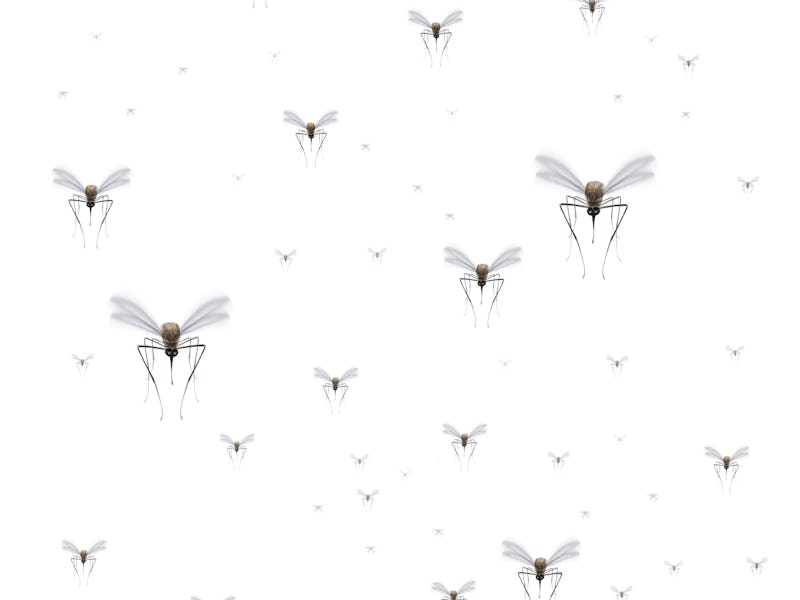How mosquitos got their taste for human blood — study
Two major factors make human blood extra appealing.

Certainly one of the worst — and definitely the itchiest — parts of summer is an increase in mosquito bites.
But of the 3,500 species of mosquitoes, only a few are prone to hunting humans. New research looks at why the needle-nosed bloodsuckers gain a preference for people in the first place.
Climate and population are the major factors that drive mosquitoes to develop a taste for human blood, finds a study published Thursday in the journal Current Biology.
As places urbanize, local mosquitoes become more likely to bite humans — but only in regions with significant dry seasons. Through genetic analysis, researchers discovered a "single, shared genomic basis" for human preference in mosquitos that live in these types of places, concentrated in a few regions of chromosomes.
The team studied the Aedes aegypti, a mosquito species known to spread Zika virus and dengue fever, among other diseases that affect humans. They collected samples from 27 sites in sub-Saharan Africa and found that 80 percent of the variation in human-versus-animal preference was explained by the confluence of dry season intensity and human population density.
Mosquitoes overall cause millions of deaths per year, making them the deadliest animals on Earth, according to the World Health Organization.
Noah Rose, who led the research, studies mosquito population hosts at Princeton University. He says that learning which ecological factors and underlying genes cause mosquitoes to prefer a human host can help protect ourselves in the future
"If we can understand how this transition occurred, we can better understand ways to disrupt mosquitoes' ability to exploit human hosts and habitats," Rose tells Inverse.
What part of the Covid-19 pandemic do you think causes the most confusion? We want to know. Take the Inverse reader survey
Finding factors — Previous to this study, researchers believed that specific habitats like drove mosquitos to bite people.
"We thought that mosquitoes that live in the forest with lots of different available animal hosts would be less attracted to humans, and mosquitoes living around people would be more attracted to humans," Rose says.
But mosquitoes living near humans in smaller towns weren't particularly attracted to humans.
"Human population density effects only kicked in when population densities got very high," Rose explains — more than a few thousand people per square kilometer, about a third of a square mile.
Mosquitoes in an olfactometer the researchers used to test preference for human hosts.
Interestingly, the preference for humans also only took effect in places with long, hot dry seasons. The researchers think that could be explained by water storage: To survive intense dry seasons, mosquitoes may rely on breeding in water stored by humans.
Also behind human preference was a specific genetic change in mosquitoes, the researchers found. They sequenced the genes of 375 mosquitoes and found that the genetic component linked to human preference was concentrated in several specific chromosomal regions.
Geographical focus — In sub-Saharan Africa, where the research samples came from, urbanization is happening quickly.
Researchers predict that rapidly growing cities may cause a shift toward biting humans in many large cities by the year 2050.
These expanding cities will be larger than the places described in the new study, leaving room for uncertainty. Mosquitoes may become more specialized in their human-seeking ways, "but we don't know if this will look like more willingness to bite humans or the evolution of strong preference for humans to the exclusion of other animals," Rose explains.
That means the decisions humans make — especially regarding equitable access to resources — could have a big impact on health in the future.
Water can collect in humans' containers, providing a place for mosquito larvae to thrive in areas with intense dry seasons.
"If we make sure that people in these rapidly growing cities have access to safe, clean water, and we try to make sure there isn't lots of open standing water in containers," Rose says, "then we can disrupt the ecology of this disease spreading mosquito."
That goes for water deliberately reserved for human use as well as water that naturally collects in small reservoirs, like tires or buckets, he says.
The new study raises concerns, Rose says, but it "can also inspire us to act in anticipation of these possible challenges."
Abstract: The majority of mosquito-borne illness is spread by a few mosquito species that have evolved to specialize in biting humans, yet the precise causes of this behavioral shift are poorly understood. We address this gap in the arboviral vector Aedes aegypti. We first collect and characterize the behavior of mosquitoes from 27 sites scattered across the species’ ancestral range in sub-Saharan Africa, revealing previously unrecognized variation in preference for human versus animal odor. We then use modeling to show that over 80% of this variation can be predicted by two ecological factors—dry season intensity and human population density. Finally, we integrate this information with whole-genome sequence data from 375 individual mosquitoes to identify a single underlying ancestry component linked to human preference; genetic changes were concentrated in a few chromosomal regions. Our findings suggest that human-biting in this important disease vector originally evolved as a by-product of breeding in human-stored water in areas where doing so provided the only means to survive the long, hot dry season. Our model also predicts that the rapid urbanization currently taking place in Africa will drive further mosquito evolution, causing a shift toward human-biting in many large cities by 2050.
This article was originally published on